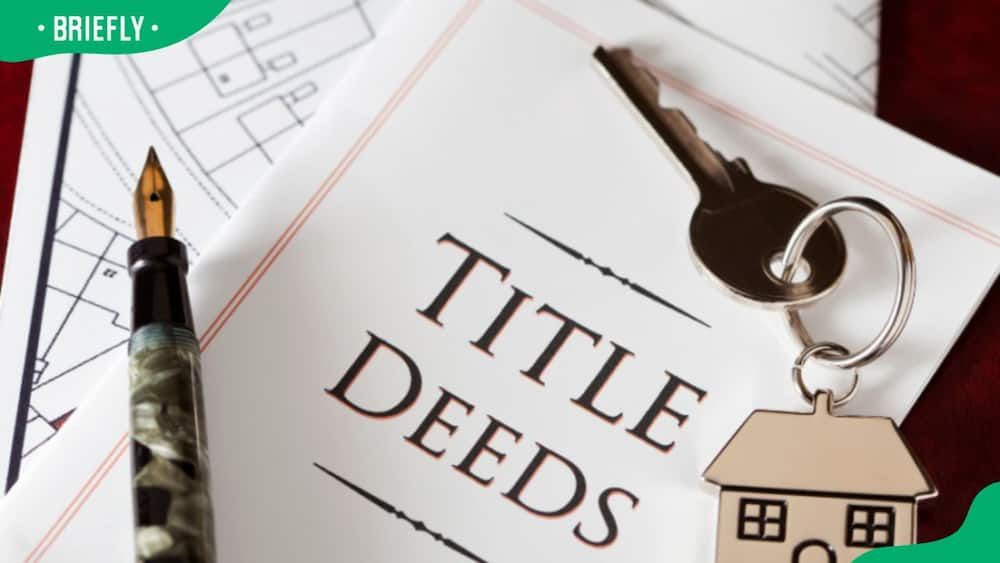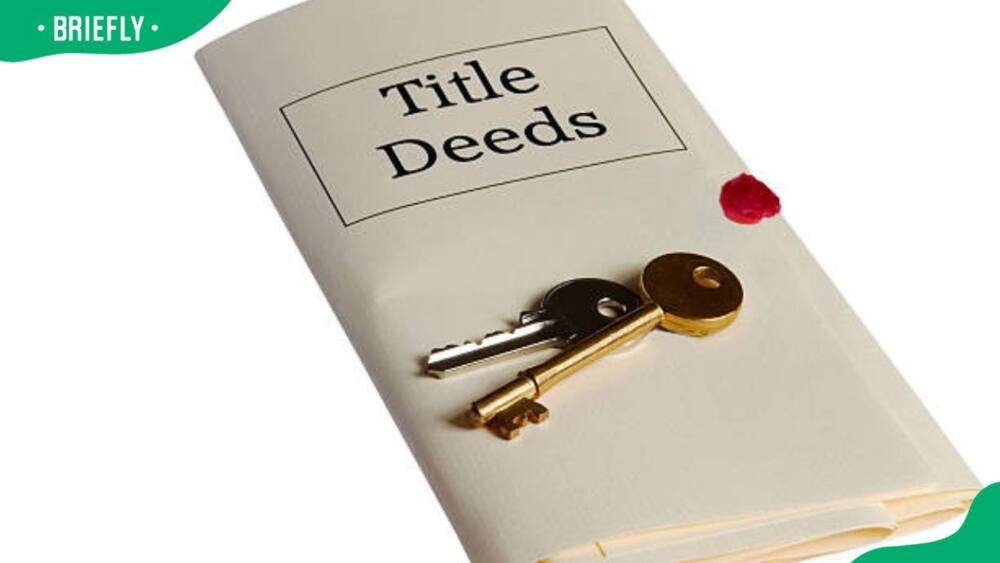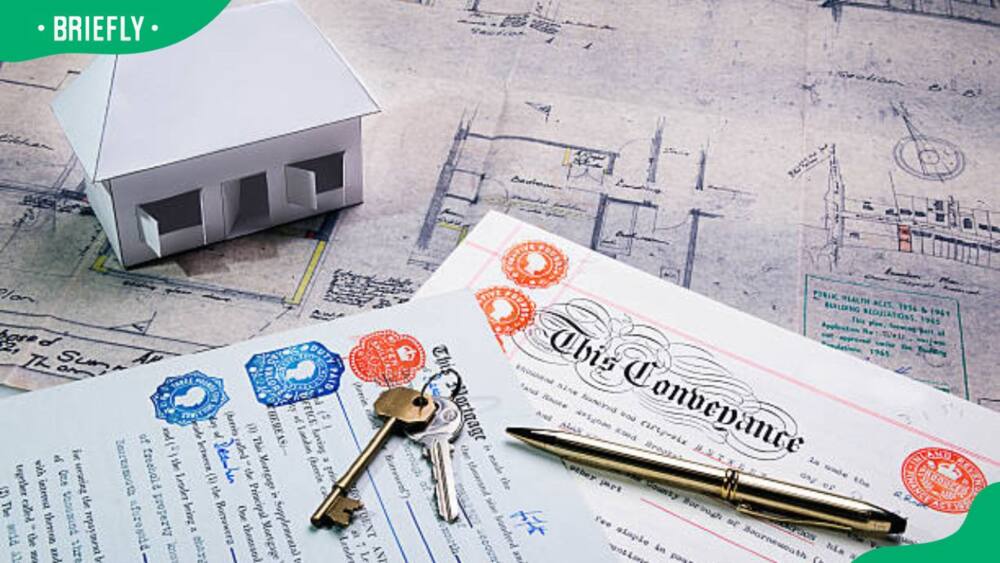What is a deed of transfer, and how is it different from a title deed?
A deed of transfer, also known as a transfer deed or a conveyance deed, is a legal document used to transfer the ownership of real property from one party (the grantor or seller) to another party (the grantee or buyer). This document is a crucial part of the property transfer process and is typically used in real estate transactions. So, is a deed of transfer the same as a title deed in South Africa?

Source: UGC
A title deed is a document that provides the historical record of ownership and serves as proof of current ownership. The title deed is updated and maintained by the deeds office, and the deed of transfer is the document that initiates the process of changing ownership and is prepared by a conveyancer or attorney.
Contents of a deed of transfer
A deed of transfer typically includes the following key elements:
Identification of the parties
The document identifies the parties involved in the transaction, including the names and addresses of the grantor and grantee.
Property description
It provides a detailed description of the transferred property, including its legal description, boundaries, and relevant identifiers like property tax or parcel numbers.
Consideration
The deed may include the purchase price or any other consideration exchanged for the property, typically stated in monetary terms.
Covenants and warranties
Deeds often include various covenants and warranties, promises and guarantees made by the grantor to the grantee. These may consist of covenants of title, quiet enjoyment, and against encumbrances, among others.

Source: Getty Images
Signatures
The deed requires the signatures of both the grantor and grantee, indicating their consent to the transfer.
Acknowledgement
Many jurisdictions require the deed to be acknowledged or notarized to make it legally valid. This involves the grantor appearing before a notary public or authorized official to confirm their identity and sign the document.
Delivery and acceptance
The deed must be delivered to the grantee and accepted by them to complete the transfer. Depending on local laws, this step may involve physical delivery of the document or other legal procedures.
Filing
The deed must be recorded with the deeds office. Recording the deed provides public notice of the change in ownership and protects the grantee's interests.
What is a title deed?
A title deed is a legal document that serves as evidence of ownership and transfers the ownership of real property from one party to another. It is a fundamental document in real estate transactions used to establish and verify ownership rights to a particular piece of real estate, such as land or a house.

Source: UGC
Deed of transfer vs title deed
A deed of transfer and a title deed are related documents in real estate transactions. Still, they serve different purposes and have distinct roles in transferring ownership of real property. Here are the key differences between them:
Purpose
A deed of transfer is primarily a legal instrument used to transfer ownership of real property from one party to another. The document facilitates the transfer of the property's ownership rights from the seller (grantor) to the buyer (grantee).
A title deed, also known as a property deed, is not typically a standalone document like the deed of transfer. Instead, it is a term used to refer to the collective set of legal documents that establish and verify ownership rights to a particular piece of real estate. These documents include the deed of transfer and other records related to the property.
Content
A deed of transfer includes specific information about the property being transferred, the names and addresses of the parties involved, the purchase price or consideration, legal descriptions of the property, covenants and warranties related to the title, and signatures. It outlines the legal steps and assurances necessary for the transfer.
In a broader sense, the content of a title deed includes the deed of transfer and any other relevant documents related to the property's history, ownership, and title, such as previous deeds, liens, encumbrances, and property tax records.

Source: UGC
Legal function
The deed of transfer is a legally binding document that conveys the property's title from the seller to the buyer. It may contain various warranties and covenants related to the title and the property.
The title deed, as a concept, represents the entire chain of documents that establish and verify the ownership of the property. It provides a complete historical record of the property's ownership and is used to prove and protect the grantee's ownership rights.
What is transfer duty in South Africa?
This is a tax the South African government imposes on transferring immovable property, such as real estate. This tax is paid by the buyer or transferee and is intended to generate government revenue while regulating property transactions. Transfer duty is governed by the South African Revenue Service (SARS).
Key points to understand about transfer duty in South Africa:
Applicability
Transfer duty is applicable when property is bought or transferred. It is based on the value of the property being transferred.
Rate structure
The rate at which transfer duty is levied depends on the property's value and is calculated according to a progressive scale, with higher rates applied to more valuable properties.
Exemptions and concessions
Some transactions may be exempt from transfer duty or eligible for concessions. For example, certain transactions involving agricultural land or primary residences may qualify for reduced rates or exemptions. It is essential to consult with a tax professional or conveyancer for specific details.

Source: UGC
Payment
The buyer is responsible for paying the transfer duty. It is typically paid to the South African Revenue Service (SARS) within six months of signing the sale agreement. Failing to pay transfer duty on time can result in penalties and interest charges.
Conveyancers
In property transactions in South Africa, conveyancers play a crucial role. They assist with the legal aspects of the property transfer, including the calculation and payment of transfer duty, ensuring that the process adheres to all legal requirements.
Changes in legislation
Due to government policy changes, transfer duty rates and regulations can change over time. Therefore, it is essential to consult the most recent tax regulations or seek advice from tax professionals when involved in a property transaction.
Can you transfer property without a lawyer in South Africa?
In South Africa, it is possible to transfer property without the direct involvement of a lawyer, but it is not recommended. Property transactions in South Africa can be legally complex, and it is generally advisable to use the services of a qualified attorney or conveyancer to ensure that the process is handled correctly, efficiently, and in compliance with the law.

Source: UGC
How do I transfer ownership of a property in South Africa?
Transferring property ownership in South Africa involves several steps and legal requirements. The process typically includes the following key steps:
Selecting a conveyancer
Appoint a conveyancer or attorney who will handle the legal aspects of the property transfer. Conveyancers are specialized legal professionals in property transactions. They will guide you through the process, ensure legal compliance, and protect your interests.
Drafting and signing the sale agreement
The seller and buyer (or their respective agents) draft a sale agreement outlining the property sale terms and conditions. This document should include details such as the purchase price, conditions of the sale, timelines, and any special conditions. Both parties must sign the sale agreement.
Title deed and property searches
The conveyancer conducts title deed and property searches to verify the property's ownership history, any encumbrances, and the current status of the title. The seller should provide the conveyancer with the property's title deed and other relevant documents.
Transfer duty and taxes
The conveyancer will calculate the transfer duty (if applicable) based on the property's value. This is a tax paid by the buyer. The buyer must pay the transfer duty to the South African Revenue Service (SARS) within six months of signing the sale agreement.
Preparation of documents
The conveyancer will draft the necessary legal documents, including the deed of transfer, transfer duty declaration, and other relevant paperwork.

Source: UGC
The signing of transfer documents
Both parties (seller and buyer) will sign the transfer documents before a commissioner of oaths or a notary public. The documents typically include the deed of transfer.
Payment and transfer of funds
The buyer must pay the purchase price, transfer costs, and transfer duty to the conveyance. The conveyancer will ensure that all funds are correctly distributed to the relevant parties, including the seller, bondholders, and local authorities.
Submission to deeds office
The conveyancer submits the transfer documents to the deeds office in the province where the property is located.
Processing and registration
The deeds office will process the transfer documents, conduct a final examination, and register the transfer of ownership if all requirements are met. Once registered, the deeds office issues a new title deed reflecting the buyer as the new owner.
The above is everything you need to know about the deed of transfer and how it differs from a title deed. Property transfer may vary based on the unique circumstances of the transaction and local regulations. Therefore, it is highly recommended to engage the services of a qualified conveyancer or attorney to ensure a smooth and legally compliant property transfer process.
DISCLAIMER: This article is intended for general informational purposes only and does not address individual circumstances. It is not a substitute for professional advice or help and should not be relied on to make decisions. Any action you take upon the information presented in this article is strictly at your own risk and responsibility!
READ ALSO: How to check title deeds in South Africa: meaning and offices
Briefly.co.za recently published an article on how to check title deeds in South Africa. A title deed is one document any landowner should have to prove land ownership.
One should learn to check title deeds to prove this legal document's authenticity. The process may differ depending on your area of residence in South Africa. The bottom line is that the process is easy and can spare you legal drama.
Source: Briefly News










